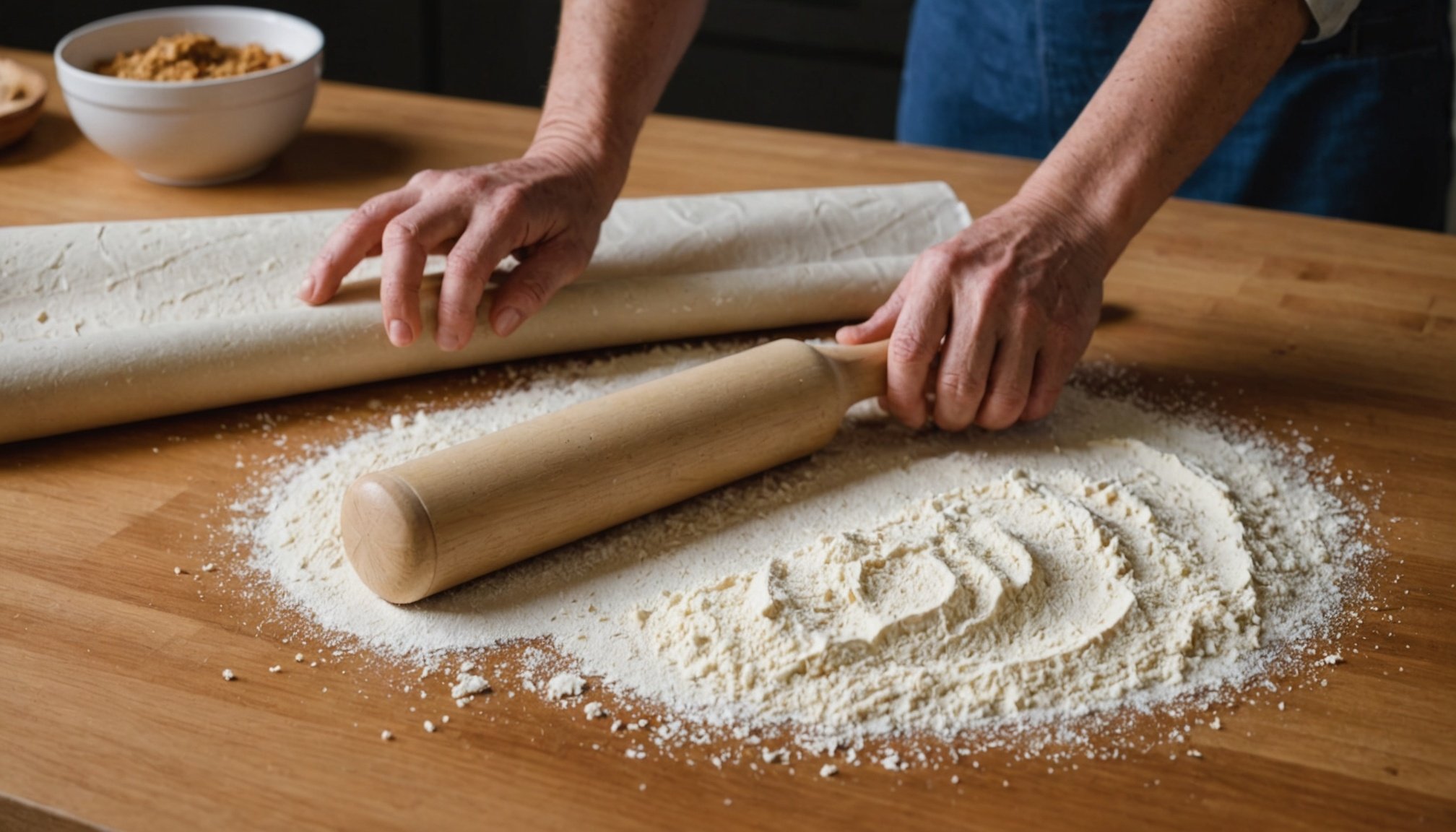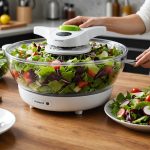Selecting the right non-stick rolling pin material can transform your baking experience. Discover how the choice between silicone, wood, and metal can impact your dough handling, rolling ease, and overall results. This guide provides valuable insights to help you make an informed decision, ensuring that your baking remains effortless and enjoyable. Say goodbye to sticky situations and embrace a smoother, more efficient baking process with the perfect rolling pin for your kitchen needs.
Overview of Non-Stick Rolling Pins
In the realm of baking tools, non-stick rolling pins are essential for ensuring a smooth baking experience. These rolling pins are designed to prevent dough from adhering to the surface, making it easier to roll out pastries, cookies, and other baked goods. The main purpose of a non-stick rolling pin is to facilitate the rolling process, reducing frustration and improving efficiency in the kitchen.
Additional reading : Mastering Culinary Precision: A Guide to Choosing the Best Built-in Oven for Accurate Temperature Control
Selecting the right rolling pin materials is crucial for achieving baking success. Different materials offer varying levels of non-stick properties and durability. For instance, silicone is a popular choice due to its excellent non-stick surface and flexibility. Other materials like marble and stainless steel are also favoured for their weight and smooth finish, which can help in rolling out dough evenly.
When choosing a non-stick rolling pin, consider the following materials:
Also to discover : Selecting the Best Heat-Resistant Fabrics for Your Ideal Grilling Apron
- Silicone: Lightweight and highly non-stick, ideal for sticky doughs.
- Marble: Heavy and cool, perfect for pastry doughs that benefit from a chilled surface.
- Stainless Steel: Durable and easy to clean, offering a sleek, modern look.
Understanding the properties of these materials will help bakers make informed decisions, ensuring that their chosen rolling pin enhances their baking endeavours.
Silicone Rolling Pins
Silicone rolling pins have become a staple in modern baking tools due to their unique characteristics and features. These rolling pins are celebrated for their flexibility and excellent non-stick properties, making them ideal for working with sticky doughs. The surface of silicone rolling pins allows dough to glide effortlessly, reducing the need for excessive flour, which can affect the texture and taste of baked goods.
Advantages of silicone rolling pins include their ease of cleaning and lightweight nature. Unlike traditional wooden rolling pins, silicone versions can be washed quickly and are often dishwasher-safe, saving time and effort in the kitchen. Their flexibility also means they can be used on a variety of surfaces without causing damage.
However, there are some considerations to keep in mind. While silicone rolling pins offer many benefits, they may have durability concerns over time, especially if used with heavy doughs. Additionally, silicone is not as heat-resistant as other materials like marble or stainless steel, which can be a limitation in certain baking scenarios.
Understanding these pros and cons will help bakers decide if a silicone rolling pin meets their needs, ensuring a smooth and enjoyable baking experience.
Stainless Steel Rolling Pins
In the world of baking tools, stainless steel rolling pins are a popular choice for their unique advantages. These rolling pins offer a perfect blend of durability, weight, and versatility, making them a reliable option for both amateur and professional bakers. Their robust construction ensures they withstand the test of time, even with frequent use.
One of the standout features of stainless steel rolling pins is their ability to maintain a consistent temperature. This temperature control is especially beneficial when working with delicate pastry doughs that require a cooler surface to prevent sticking. The weight of stainless steel also aids in applying even pressure, resulting in uniformly rolled dough.
However, it's important to note that without proper flouring, there is a potential for sticking. While stainless steel does not inherently possess non-stick properties, this can be easily managed by lightly dusting the rolling pin and the dough with flour. This simple step ensures a smooth rolling experience, preventing dough from clinging to the surface.
When comparing materials, stainless steel stands out for its sleek appearance and ease of cleaning. These material comparisons highlight the practical benefits and aesthetic appeal, making stainless steel rolling pins a valuable addition to any baker's collection.
Wooden Rolling Pins
Wooden rolling pins are a timeless choice among baking tools, cherished for their classic feel and versatility. These rolling pins come in various types, including the traditional cylindrical design and the tapered French style, each offering unique benefits for different baking tasks.
One of the primary advantages of wooden rolling pins is their natural non-stick properties, which can be enhanced with proper seasoning. By regularly oiling the wood, bakers can prevent dough from sticking, allowing for a smoother rolling process. This seasoning not only maintains the pin's effectiveness but also extends its lifespan.
However, wooden rolling pins require more maintenance than their silicone or stainless steel counterparts. They are susceptible to warping if exposed to excessive moisture or heat. To avoid this, it's crucial to hand wash them promptly and dry them thoroughly after each use. Additionally, wooden rolling pins should never be soaked or placed in a dishwasher, as this can compromise their integrity.
Despite these maintenance needs, the tactile experience and aesthetic appeal of wooden rolling pins make them a beloved staple in many kitchens. Their ability to provide a controlled, even roll, coupled with their traditional charm, ensures they remain a favourite among both novice and experienced bakers.
Comparison of Non-Stick Materials
When choosing the right baking tools, understanding the differences in rolling pin materials is essential. Each material—silicone, stainless steel, and wood—offers distinct advantages that cater to various baking needs.
Silicone: Known for its flexibility and non-stick properties, silicone rolling pins are ideal for sticky doughs. They are lightweight and easy to clean, though they may not be as durable with heavy doughs.
Stainless Steel: These rolling pins are praised for their durability and weight, providing consistent pressure for even rolling. Their ability to maintain a cool surface is beneficial for pastry work, although light flouring is recommended to prevent sticking.
Wood: Wooden rolling pins offer a classic feel with natural non-stick properties, especially when properly seasoned. They require more maintenance but provide a tactile experience cherished by many bakers.
A visual chart can help in comparing these materials based on factors like non-stick effectiveness, ease of cleaning, and durability. Insights from user reviews and expert recommendations highlight that while silicone is excellent for ease of use, stainless steel offers precision, and wood delivers a traditional experience. By evaluating these aspects, bakers can select the rolling pin that best suits their specific baking requirements.
Choosing the Right Rolling Pin for Your Baking Needs
Selecting the ideal rolling pin involves considering several factors to align with your baking preferences. The frequency of baking, the types of dough you work with, and your personal style all play a crucial role in making a personalized choice.
For those who bake frequently, durability becomes paramount. A stainless steel rolling pin might be the best option due to its robust nature and ability to handle repetitive use without wear. If your baking mainly involves pastry dough, the cool surface of marble or stainless steel can be advantageous, providing the necessary temperature control.
Beginners might prefer silicone rolling pins. Their lightweight design and excellent non-stick properties make them forgiving and easy to handle, especially when dealing with sticky doughs. Experienced bakers, on the other hand, might appreciate the tactile feedback and control offered by wooden rolling pins, which can enhance their baking precision.
For specific applications like pizza dough, a heavier rolling pin can be beneficial to achieve the desired thinness and evenness. Ultimately, the key is to evaluate your baking habits and choose a rolling pin that complements your needs, ensuring a seamless and enjoyable baking experience.
Maintenance Tips for Non-Stick Rolling Pins
Proper rolling pin maintenance is key to ensuring your baking tools remain effective and long-lasting. Each material requires specific care tips to maintain its functionality and appearance.
Cleaning and Storing
For silicone rolling pins, a simple wash with warm soapy water is usually sufficient. They are often dishwasher-safe, but checking the manufacturer's guidelines is wise. Stainless steel pins should be cleaned with a mild detergent and dried thoroughly to prevent water spots. Wooden rolling pins demand more attention; they should be hand-washed and dried immediately to avoid warping.
Seasoning and Avoiding Harsh Chemicals
Seasoning is crucial for wooden rolling pins. Regularly applying a food-safe oil helps maintain their natural non-stick properties and prevents cracking. Avoid using harsh chemicals or abrasive scrubbers on any rolling pin, as these can damage the surface and affect performance.
Prolonging the Life of Your Rolling Pin
Store your rolling pins in a dry, cool place, preferably in a drawer or on a rack to prevent accidental damage. For wooden pins, occasional re-seasoning will extend their lifespan. By following these care tips, you can ensure your rolling pin remains a reliable companion in your baking adventures.
User Reviews and Recommendations
In the world of baking, user reviews provide valuable insights into the performance and usability of non-stick rolling pins. The baking community often shares their experiences, highlighting the strengths and weaknesses of different products. These reviews are instrumental in guiding new buyers toward making informed decisions.
Top-rated non-stick rolling pins frequently mentioned in product recommendations include those made from silicone, stainless steel, and wood. Silicone rolling pins are praised for their lightweight nature and non-stick surface, making them a favourite for handling sticky doughs. Stainless steel pins are lauded for their durability and ability to maintain a consistent temperature, which is beneficial for pastry work. Wooden rolling pins, while requiring more maintenance, are cherished for their tactile feedback and traditional charm.
Community feedback often emphasizes the importance of considering personal baking needs when selecting a rolling pin. For instance, frequent bakers might lean towards stainless steel for its longevity, while beginners may opt for silicone due to its ease of use. Baking community discussions also highlight the aesthetic appeal of wooden pins, which many find enhances their baking experience.
By consulting user reviews and engaging with the baking community, individuals can find the perfect rolling pin that aligns with their baking preferences.
Conclusion and Final Thoughts
Selecting the right rolling pin is crucial for achieving baking success. With a variety of materials available, each offering distinct advantages, the choice can significantly impact your baking experience. From silicone's flexibility to the durability of stainless steel and the classic charm of wood, each material caters to different needs and preferences.
Experimentation with different rolling pin types is encouraged to find the perfect fit for your baking style. Trying various materials can reveal which one aligns best with your dough types and baking frequency. For instance, silicone might be ideal for those dealing with sticky doughs, while stainless steel could be better for those requiring consistent pressure and temperature control.
We invite readers to share their experiences with non-stick rolling pins. Your insights can help others make informed decisions and enhance their baking journeys. Whether you've found a particular material that revolutionised your baking or discovered tips for maintenance, your feedback is invaluable. Engaging with the baking community not only enriches your knowledge but also contributes to the collective wisdom of fellow bakers.











